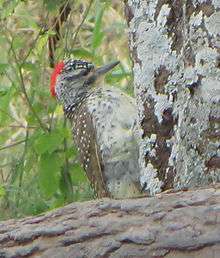Nubian woodpecker
| Nubian woodpecker | |
|---|---|
 | |
| Male in Samburu National Reserve, Kenya | |
| Scientific classification | |
| Kingdom: | Animalia |
| Phylum: | Chordata |
| Class: | Aves |
| Order: | Piciformes |
| Family: | Picidae |
| Genus: | Campethera |
| Species: | C. nubica |
| Binomial name | |
| Campethera nubica (Boddaert, 1783) | |
The Nubian woodpecker (Campethera nubica) is a species of bird in the Picidae family. It is distributed widely in Central and Eastern Africa, from Chad in west to Somalia in east and Tanzania in south. It is a fairly common species with a wide range, the population seems stable, and the International Union for Conservation of Nature has rated its conservation status as being of "least concern".[1]
Description

The Nubian woodpecker Is a medium-sized species growing to a length of about 21 cm (8.3 in). The male has a red crown and nape and a reddish streak on the cheek, while the female has a black crown speckled with white, a red nape, and a dark cheek stripe with white speckling. In other respects, the sexes are similar. The upper parts are olive-brown with much cream speckling and barring. The wings are greenish-brown barred with white and the tail greenish-yellow barred with brown, the shafts of the feathers being gold. The throat is cream and the head, neck, breast and belly are white, spotted and barred with black. The beak is grey with a dark tip, the eye red or pink, the orbital ring grey and the feet olive or grey. Various vocalisations are made, shrill ringing or piping notes repeated, often musical but sometimes metallic. Often sung in duet.[2]
Distribution and habitat
The Nubian woodpecker is endemic to eastern Africa. Its range includes Chad, Democratic Republic of the Congo, Djibouti, Eritrea, Ethiopia, Kenya, Somalia, South Sudan, Sudan, Tanzania and Uganda.[1] Its typical habitat is open savannah woodland, especially with Acacia and Euphorbia, bushy areas and scrub. It is a non-migratory bird, and is found at altitudes up to 2,000 m (6,600 ft).[2]
Ecology
The Nubian woodpecker often feeds alone, keeping in touch with its mate vocally. It forages mostly in trees, but also on the ground, for ants and termites, also consuming spiders and beetles.[2]
References
- 1 2 3 BirdLife International (2012). "Campethera nubica". IUCN Red List of Threatened Species. Version 2013.2. International Union for Conservation of Nature. Retrieved 26 November 2013.
- 1 2 3 Gerard Gorman (2014). Woodpeckers of the World: The Complete Guide. A&C Black. pp. 172–174. ISBN 978-1-4081-4717-7.
| Wikimedia Commons has media related to Nubian woodpecker. |
